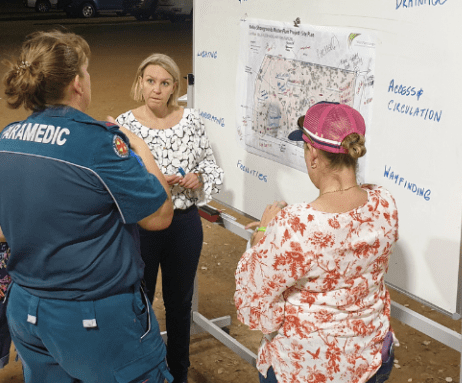PLANNING APPROVAL SUCCESS ACROSS QUEENSLAND
Expert Planning Approval Services from City to Country Queensland
Welcome to Planning Approval Group, your trusted partner in navigating Queensland's complex planning approval landscape. With over two decades of town planning experience across Queensland, we're committed to delivering honest, expert, and timely planning approval services that turn your vision into reality. Our team specialises in securing planning approvals for projects throughout Queensland, from Brisbane and the Gold Coast to regional areas. We've made a commitment to always operate with integrity and in the best interests of our clients. Whether you need help planning your next development or assistance with Material Change of Use applications, our highly qualified and experienced Queensland planning approval team can help get your next project approved on time and within budget.
Why Choose Planning Approval Group for Your Queensland Planning Approval Needs?
There When
You Need Us
There When You Need Us. Don't spend hours on the phone or days waiting for a callback. At Planning Approval Group, you can speak with a Queensland town planner specialised in planning approvals on the spot. We provide planning approval consultations with a quick turnaround so you can focus on the things that matter.
One-Hour Session
Guaranteed
We're proud to offer our clients one-hour town planning sessions focused on your planning approval requirements. With a heavy focus on realising your vision within Queensland's planning frameworks, we're committed to providing you with written planning approval advice within 48 hours. That's our promise, guaranteed!
Fast Turnaround
Times
We don't like to keep our clients waiting for planning approvals, which is why we deliver on our promise to have preliminary planning approval reports drafted and handed over to you within five business days. That's the Planning Approval Group guarantee for Queensland developments.
Price on
Application
Hefty up-front fees aren't our thing. Our team of Queensland town planning consultants will prepare and submit planning approval applications within one month of your instruction provided all supporting information has been supplied. Alternatively, we can arrange and project manage the preparation of full supporting documentation for your planning approval.
Our Comprehensive Queensland Planning Approval
SERVICES
The Planning Approval Group ADVANTAGE in Queensland
Integrity-Driven Approach:
We operate with unwavering integrity, always prioritising your best interests throughout the Queensland planning approval process.
End-to-End Solutions:
From initial consultation to final planning approval, we're with you every step of the way, navigating Queensland's unique planning landscape.
Clear Communication:
Complex Queensland planning approval processes explained in simple, understandable terms by experts who know the local systems.
Queensland Planning Approval HEALTH CHECK
Unlock your property's true potential with our Queensland Planning Approval Potential Health Check. This comprehensive assessment reveals:
- Development opportunities within Queensland's planning approval framework
- Potential risks and challenges in the local planning approval process
- Strategies for successful planning approval outcomes in your specific Queensland location
Don't leave your project's success to chance. Our Queensland planning approval health check provides the insights you need to make informed decisions and optimise your development plans within the local regulatory environment.
What Our Queensland Clients Say About Our Planning Approval Services
"Planning Approval Group's practical approach and commitment to making our Brisbane project work were invaluable. Their clear communication and professionalism in securing planning approval set them apart from other consultants we've worked with in Queensland."
Sarah T.,
Brisbane Developer
"The team's ability to explain complex Queensland planning approval processes in simple terms made all the difference. They turned our vision into reality by efficiently navigating the Gold Coast planning approval system."
John M.,
Gold Coast Investor
"Renee was brilliant with our planning approval application. Very happy to use PAG again, particularly with the level of service received and how quickly our Queensland planning approval was wrapped up - it made my job much easier so that I could carry on with other aspects of the project."
Shelley O.,
BENTLEIGH SIGN GROUP
Ready to Secure Your Queensland Planning Approval?
Don't let planning hurdles delay your Queensland project.
Contact Planning Approval Group today and experience the difference our expert Queensland planning approval services can make.
The Queensland Planning Approval Process Simplified
At Planning Approval Group, we understand that the Queensland planning approval process can seem daunting. That's why we've developed a streamlined approach to guide you through each stage:
01
Initial Consultation:
We discuss your project goals and assess the specific Queensland planning approval requirements for your location.
02
Site Analysis:
Our experts conduct a thorough evaluation of your property within the context of Queensland planning regulations and local council requirements.
03
Strategy Development:
We create a tailored Queensland planning approval strategy designed to maximise your chances of success with local authorities.
04
Application Preparation:
Our team meticulously prepares all necessary documentation for your Queensland planning approval submission, ensuring compliance with state and local requirements.
05
Lodgement and Tracking:
We lodge your application with the appropriate Queensland authority and actively track its progress through the planning approval system.
06
Negotiation and Advocacy:
If required, we engage with relevant Queensland authorities to address any concerns and advocate for your project's planning approval.
07
Approval and Implementation:
Upon receiving planning approval, we guide you through the next steps to bring your Queensland project to life, including any post-approval requirements.
Industry news
The Latest Insights



Contact Planning Approval Group today to schedule your one-hour consultation and receive expert planning approval advice within 48 hours.
Book Your Queensland Planning Approval Consultation Now
Speak directly with a qualified Queensland planning approval expert and take the first step towards development success.
Let Planning Approval Group be your guide to planning approval success across Queensland. From Brisbane and the Gold Coast to regional towns and rural areas, we're here to turn your planning challenges into opportunities. Trust in our Queensland planning expertise to navigate the complexities of the local planning approval process and bring your development vision to fruition.









